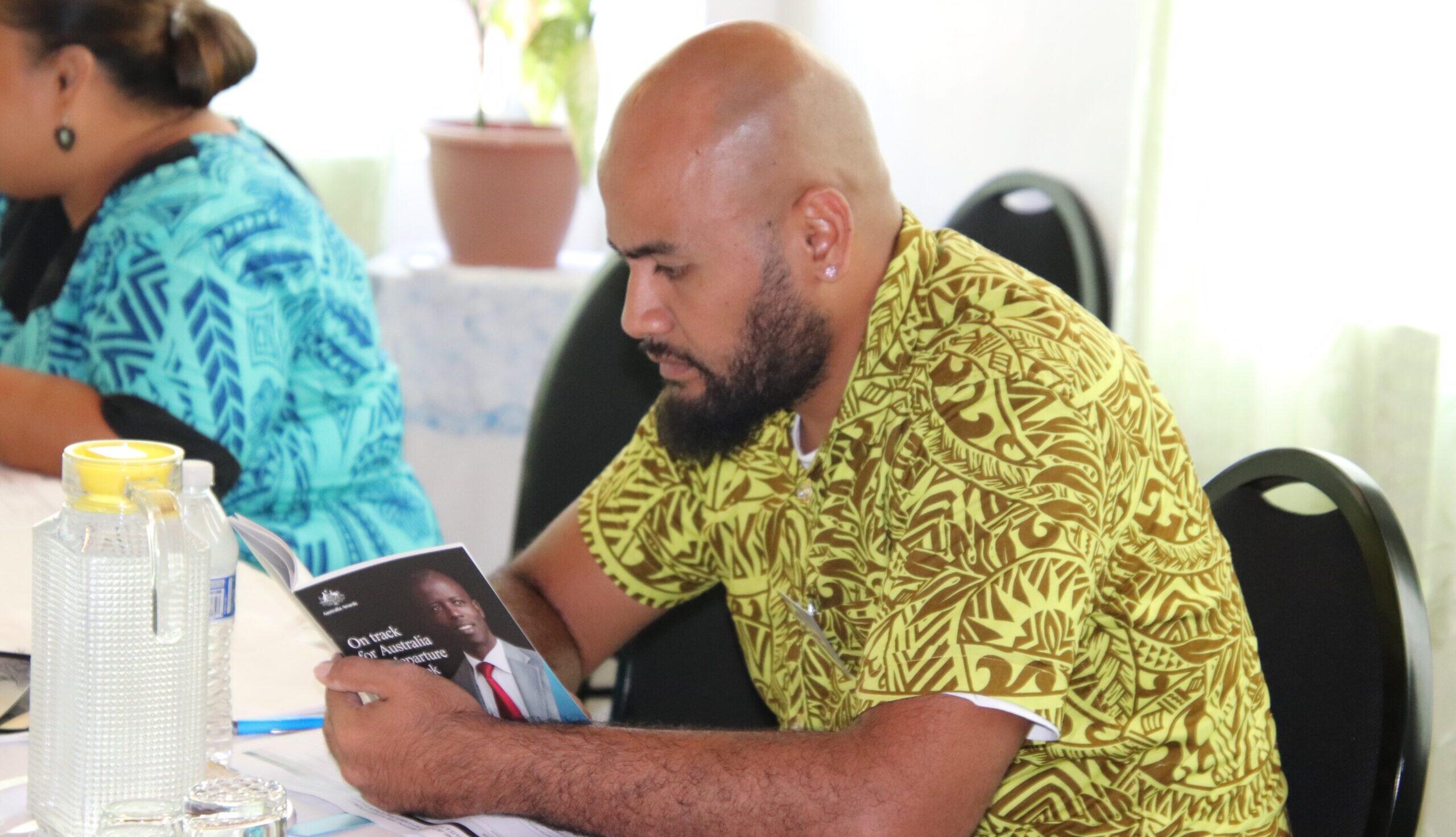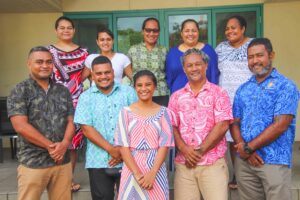Australia Awards Scholarships (AAS) offer Tuvalu citizens the opportunity to undertake full-time study in Australia in priority fields relating to Tuvalu’s development.
Who can apply for an AAS:
Australia Awards applicants must meet all eligibility requirements detailed in the Australia Awards Scholarships Policy Handbook.
In addition to meeting the general eligibility criteria, applicants must also meet the following specific eligibility requirements to be considered for this award:

For Undergraduate level study:
- have completed Year 12 Certificate Examination with a minimum aggregate mark of 300 out of 400 (including English and three best subjects) or equivalent and must be studying Year 13. Scholarship will be dependent on applicant achieving a minimum aggregate result of 300 out of 400 in 2024; OR
- have completed Year 13 Certificate Examination with a minimum aggregate mark of 300 out of 400 (English and three best subjects) or equivalent.
- mature age applicants who have:
- completed a qualification, should have minimum five years’ relevant work experience
- not completed a qualification, must have a minimum of 10 years relevant work experience and have achieved pass grades in either Year 12/13 or have successfully undertaken some form of relevant tertiary studies or work-related training
For Postgraduate level study:
- must hold a first degree and have at least two years’ relevant work experience;
- who do not hold a first degree must have at least 10 years’ relevant work experience and have achieved a pass grade in either Year 12/13 or have successfully undertaken some form of relevant tertiary studies or work-related training;
- must not hold a Master’s degree either at time of application or commencement of award.
Women, persons with disabilities and individuals from traditionally marginalised groups are encouraged to apply.
What can I study:
Australia Awards Scholarships are offered at undergraduate and postgraduate level for study in 2025.
Applications for study should align with the priorities identified in Tuvalu’s National Development Plan.
For Intake 2025, the Governments of Tuvalu and Australia have agreed on the following priority fields of study and areas of specialisation:
For Undergraduate and Postgraduate
Environment & Climate Change
Including but not limited to:
Agriculture, Climate Change, Disaster Preparedness and Reconstruction, Disaster Risk Reduction, Environment and Occupational Health & Safety, Environment and Public Health, Environment and Sustainability, Environmental and Business Management, Environmental Economics and Climate Change, Environmental Law, Environmental Management and Sustainability, Environmental Management, Environmental Risk Assessment Remediation, Environmental Science, Food Security, Global Environment and Climate Change Law, Land and Water Management, Marine Coastal Management, Marine Science, Renewable Energy, Science, Waste Management.
Economic Growth & Governance
Including but not limited to:
Accounting, Applied Finance, Banking, Business and Law, Commerce, Communication, Development Economics, Development Studies, Digital Media, Entrepreneurship, Environmental and Resource Economics, Financial Management, Governance Studies, Graphic Studies, Human Resources Planning and Management, Innovation Management and Commercialisation, International Marketing, Journalism, Labour Market analysis, Law and Development, Local Governance Studies, Management and Business Administration, Political Studies, Project Management, Public Administration, Public Policy, Security and Strategic Studies, Statistics, Tourism and Hospitality.
Education
Including but not limited to:
Curriculum Education, Disability Studies, Early Childhood Education, Educational Studies, Leadership and Management in Education, Physical Education, Special and Inclusive Education, Teaching (Early Childhood, Primary, Secondary), Teaching English as a Second Language, TVET Education and Training.
Gender, Disability & Social Inclusion
Including but not limited to:
Behavioural Studies, Community Development, Disability Management, Disability Studies, Family Studies, Gender Studies, Psychology, Social Change and Development, Social Science.
Infrastructure Support
Including but not limited to:
Aircraft Maintenance Engineering (mechanical/avionics – FNU only), Architecture, Aviation Management (Griffith University only), Civil Engineering, Computer Science, Electrical Engineering, Mechanical Engineering, Construction, Project Management, Architecture, Terminal Management, Ports and Logistics, Maritime Surveying and Technical, Telecommunication Engineering, Surveying Engineering, Software Engineering, Information Technology, Information Systems.
Health
- Clinical (Including but not limited to): Biomedical Science, Exercise and Sport Science, Food Science and Human Nutrition, Health Science, Medical Science, Medical Statistics, Medicine, Mental Health Nursing, Midwifery, Nursing, Nutrition and Dietetics, Oral Health, Pharmacy, Physiotherapy, Public Health (non-communicable diseases), Workplace Health and Safety.
- Non-clinical (Including but not limited to): Contract Management, Disaster Management, Financial Health Planning, Health Administration, Health Information Systems, Hospital Management, Human Resources and Asset Management, Logistics and Supply Chain Management, Training and Development, Warehouse Management.
Australia Awards offer emerging Fijian and Tuvaluan leaders the opportunity to undertake full-time tertiary study.
Applicants must research Australian universities to find courses that best fit their academic background, career and leadership ambitions and which will enable them to contribute meaningfully to development of Tuvalu. We encourage applicants to visit the Commonwealth Register of Institutions and Courses for Overseas Students (CRICOS) to start their search.
The application process:
Applications must be lodged online through the Online Australia Awards Information System – (OASIS)
Australia Awards Pacific Scholarships (AAPS) provide Tuvalu citizens with the opportunity to study at selected education institutions in the Pacific region.
AAPS will be offered for full-time Technical and Vocational Training (TVET), Undergraduate, and Postgraduate level of study.
Who can apply for an AAPS:
Australia Awards applicants must meet all eligibility requirements detailed in the Australia Awards Pacific Scholarships Policy Handbook.
In addition to meeting the general eligibility criteria, applicants must also meet the following country-specific eligibility requirements:
- proposed program of study must align to a priority sector
- must have a Tuvalu Year 12 Certificate Examination with a minimum aggregate result of 250 out of 400 (English and three best subjects) or equivalent
- mature age applicants must have at least three years’ relevant work experience and achieved a pass grade in Year 12/13 (or equivalent through some form of continuing education or work-related training)
- must not hold an equivalent level of qualification (ie proposed course must be progressive in level of study); and
- must not be serving an existing scholarship bond with any other government.
Women, people with disabilities and individuals from traditionally marginalised groups are encouraged to apply.
What can I study:
The Priority fields of study available for the AAPS are the same as the AAS priority fields (listed above).
Again, applications for study should align with the priorities identified in Tuvalu’s National Development Plan.
Where can I study:
Australia Awards Pacific Scholarships are available for study at the following regional institutions:
Fiji:
– University of South Pacific
– Fiji National University
PNG:
– Pacific Adventist University
– Divine Word University
– Goroka University
– University of PNG
– University of Natural Resources & the Environment
– PNG University of Technology
– PNG Maritime College
The application process:
Applications must be lodged online through the Online Australia Awards Information System – (OASIS)
Women, persons with disabilities and individuals from traditionally marginalised groups are encouraged to apply.
